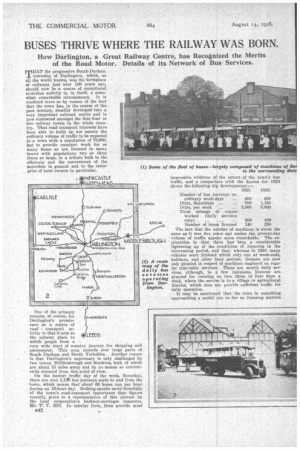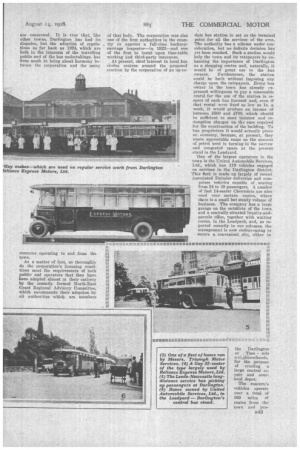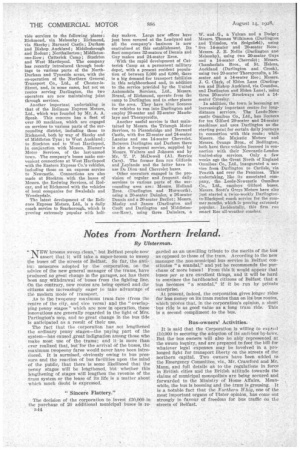BUSES THRIVE WHERE THE RAILWAY WAS BORN.
Page 68

Page 69

Page 70

If you've noticed an error in this article please click here to report it so we can fix it.
How Darlington, a Great Railway Centre, has Recognized the Merits of the Road Motor. Details of its Network of Bus Services.
THAT the progressive South-Durham township of Darlington, which, as all the world knows, was the birthplace of railways just over 100 years ago, should now be a centre of exceptional motorbus activity is, in itself, a seinewhat remarkable circumstance. It is rendered more so byreason of the fact that the town has, in the course of the. past century, steadily developed into a very important railroad centre and is now numbered amongst the first font or five railway towns in the whole country. That road transport interests have been able to build up not merely the ordinary volume of traffic to be expected In a town with a population of 70,000, but to provide constant work for as many buses as are "licensed in many towns with populations two or three times as large, is a tribute both to the efficiency and the convenience of the motorbus in general and to the enterprise of local owners in particular.
One of the primary reasons, of course, for Darlington's prominence as a centre of road transport activity is that it acts as the natural place to which. people from a very wide tract of country journey for shopping and amusement This area extends over large parts of South Durham and North Yorkshire. Another reason is that Darlington's supremacy is only challenged by two towns, Middlesbrough and Stockton, both of which are about 15 miles away and by no means so conveniently situated from this point of view.
On the busiest traffic day of the week, Saturday, there are over 1,141 bus journeys made to and from the town, which means that about 60 buses run per hour during an 18-hour day. Nothing speaks more' forcefully of the town's road-transport importance than figures recently, given to a representative of this journal by the local corporation's hackney-carriages inspector, Mr. T. V. Hill. In tabular form, these provide most •
LJAR.P.DAT E
LEEDS
0
impressive evidence ofi the extent of the town's bus traffic, and a compart on with the figures for 1923 shows the following bi developments :—
1923. 1928.
Number of bus journeys on ordinary week-days ... 400 650 Ditto, Saturdays ... 700 1,150 Ditto, per week ... ... 3,000 5,000 Total mileage of routes ' worked (daily, services only) ... 400 Number of bus licensed 240 250
The fact that the n tuber of machines is about the same as it was five ye rs ago makes the present-day volume of traffic applier more remarkable. The explanation is that there has been a considerable tightening up of the conditions of licensing in the intervening period, and that, whereas in 1923 many vehicles were licensed which only ran at week-ends, holidays, and other busy periods, licences are now only granted in respect of machines employed on regular time-table services. These are mostly daily services, although, in a few instances, licences are granted for running on two, three or four days a week, where the service is to a village or agricultural district, which does not provide sufficient traffic for daily operation.
It may be mentioned that the town is something approaching a model one so far as licensing matters
are concerned. It is true that, like other towns, Darlington has had its disputes, but the adoptiOn of regulations as far back as 1924, which are both in the interests of the travelling public and of the bus undertakings, has done much to bring about harmony between the corporation and the many
concerns operating to and from the town.
As a matter of fact, so thoroughly do the corporation's licensing conditions meet the requirements of both public and operators that they have been adopted almost in their entirety by the recently formed North-East Coast Regional Advisory Committee, which recommends their adoption by all authorities which are members
of that body. The corporation was also one of the first authorities in the country to appoint a full-time hackneycarriage inspector—in 1923—and one of the first to insist upon time-table working and third-party insurance.
• At present, chief interest in local bus circles centres around the proposed erection by the corporation of an up-to date bus station to act as the terminal point for all the services of the area.
The authority has a scheme under con sideration, but no definite decision has yet been reached. Such a station would help the town and its ratepayers by en hancing the importance of Darlington as a shopping centre and, naturally, it would be of great use to the bus owners. Furthermore, the station ceuld be built without imposing any charge upon the ratepayers. Every bus owner in the town has already expressed willingness to pay a reasonable rental for the use of the station in respect of each bus licensed and, even if that rental were fixed as low as 1s. a week, it would produce an income of between MOO and £700, which should be sufficient to meet interest and redemption charges on ths sum required for the construction of the building. To bus proprietors it would actually prove an economy, because, at present, they waste appreciable sums on the amount of petrol used in turning in the fiarrow and congested space at the present stand in the Leadyard.
One of the largest operators in the town is the United Automobile Services, Ltd., which has 119 vehicles engaged on services in the Darlington district This fleet is made up largely of recent Associated Daimler deliveries and comprises vehicles capable of . seating from 24 to 39 passengers. A number of fast 14-seater Chevrolets are also used over certain routes, where there is a small but steady volume of business. The company has a large garage on the outskirts of the town and a centrally situated inquiry-andparcels office, together with waiting
rooms, in the Leadyard, and, as reported recently in our columns, the
management is now endeavouring to secure a convenient site, either in the Darlington or Tees side n e i ghbourhoods, for the purpose of erecting a large central repair and overhaul depot.
The concern's vehicles operate over a total of 160 miles of routes from the town and pro vide services to the following places: Richmond, via Melsonby ; Richmond, via Skeeby ; Barnard Castle; Durham and Bishop Auckland; Middlesbrough and Redcar ; Northallerton; Middletonone-Row ; Catterick Camp ; Stockton and West Hartlepool. The company has recently introduced through bookings to various parts of the NorthDurham and Tyneside areas, with the co-operation of the Northern General, Transport Co., Ltd., of Chester-leStreet, and, in some cases, but not on routes serving Darlington, the two operators are now maintaining joint through services.
Another important undertaking is that of the Reliance Express Motors, Ltd., which was founded by Mr. A. A. Speak. This concern has a fleet of over 30 machines, which are engaged on services to various parts of the stirrounding district, including those to Richmond, both by way of Sheehy and of Middleton Tyas ; to West Auckland ; to Stockton and to West Hartlepool, In conjunction with Messrs. Blumer's Motor Services, of the last-named town. The company's buses make convenient connections at West Hartlepool with the Eastern Express Co.'s vehicles, including those on an express service to Newcastle. Connections are also made at Stockton with the buses of Messrs. the Redwing Services, of Redcar, and at Richmond with the vehicles or local companies for Swaledale and Wensleydale.
The latest development of the Rollonce Express Motors, Ltd., is a daily coach service to Scarborough, which is Proving extremely popular with holi
day makers. Large new offices have just been secured at the Leadyard and all the company's • business is now centralized at this establishment. Its fleet comprises 32-seaters of Dennis and Guy makes and 24-seater Rees.
With the rapid development of Catterick Camp as a permanent military depot, with a present resident population of between 5,000 and 6,000, there is a big demand for transport fabilities in this neighbourhood and, in addition to the service provided by the United Automobile Services, Ltd., Messrs. Brand, of Richmond, operate from the camp to Darlington and to other places in the area. They have nine licences for vehicles to run into Darlington and employ 20-seater and 32-seater Maudelays and Thornycrofte.
Another useful service is that maintained by Messrs. the Triumph Motor Services, to Piercebridge and Barnard Castle, with five 22-seater and 24-seater Lancias and one 14-seater Chevrolet. Between Darlington and Durham there is also a frequent service, supplied by Messrs. Walters and Johnson and by Mr. T. P. McDowell (Al. Service Cars). The former firm run Gilthrds and ‘Leylands and the latter have in use De Dion and Chevrolet buses.
Other operators engaged in the provision of regular and frequent daily services to various parts of the surrounding area are : Messrs. Holland Bros. (Darlington and Hurworth), using a 20-seater Daimler, a 26-seater Dennis and a 20-seater Berliet ; Messrs. Mosley and James (Darlington and Croft and Darlington and Middletonone-Row), using three Daimlers, a
W. and , G., a 'Vulcan and a Dodge ; Messrs. Thomas Wilkinson (Darlington and Trimdon, via Sedgefield), using five 14-seater and 20-seater Reos ; Messrs. 3. R. Nellis (Darlington and Melsonby), using two 20-seater Guys and a 14-seater Chevrolet ; Messrs. Chamberlain Bros., of St. Helens, Auckland (Darlington and Crook), using two 20-seater Thornycrofts, a 16seater and a 14-seater Reo ; Messrs. S. G. Clark, of Eldon Lane (Darlington and Bishop Auckland, via Coundon, and Darlington and Eldon Lane), using three 20.seater Brockways and a 14seater Crossley.
In addition, the town is becoming an increasingly important centre for longdistance services. The Leeds-Newcastle Omnibus Co., Ltd., has licences for ten Gilford 20-seater and 24-seater machines and uses Darlington as the starting point for certain daily journeys in connection with this route; while Messrs. the Majestic Motors and Messrs. Orange Bros., of Bedlington, both have three vehicles licensed in connection with their Newcastle-London limited-stop services. Only a few weeks ago the Great North of England Omnibus Co., Ltd., inaugurated a service from Darlington to Carlisle' via Pen rith told over the Pennines. This undertaking, like its associated company, the Leeds-Newcastle Omnibus Co., Ltd., employs Gilford buses. Messrs. Scott's Greys Motors have also just started a twice-weekly Darlingtonto-Blackpool coach service for the summer months, which is proving extremely Popular. Incidentally, this firm rue smart Reo all-weather coaches.




















































































































